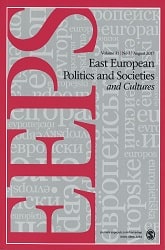Forms of Inter-party Cooperation. Electoral Coalitions and Party Mergers
Forms of Inter-party Cooperation. Electoral Coalitions and Party Mergers
Author(s): Raimondas Ibenskas, Nicole BolleyerSubject(s): Political Philosophy, Government/Political systems, Political behavior, History and theory of political science
Published by: SAGE Publications Ltd
Keywords: inter-party cooperation; party merger; party organization; electoral coalitions; party systems;
Summary/Abstract: Various forms of inter-party cooperation have important effects on party system fragmentation and stability in young democracies. However, the conceptualisation and measurement of these forms of inter-party cooperation and the examination of their consequences on party system development remain limited in the literature on parties and party systems. This research addresses this gap in the scholarship in three ways. First, we present the analytical scheme of different types of party cooperation. We argue that the forms of inter-party cooperation vary on two dimensions. The first dimension refers to their structural basis: the stability of the cooperation as captured by whether it is rule-based or, in other words, underpinned by shared rules that are mutually accepted. The second dimension refers to their scope: the number of functional areas of party life subject to cooperation. The two dimensions lead us to four basic forms of inter-party cooperation: (1) non-rule-based, functionally restricted coalitions; (2) rule-based, functionally restricted coalitions; (3) non-rule-based organization-wide mergers; and (4) rule-based organization-wide mergers. Second, we develop theoretical expectations on the frequency of these forms of inter-party cooperation in Central and Eastern Europe. Third, to test these expectations, we present empirical evidence on the number of electoral coalitions and mergers in the first six electoral periods in 10 countries in the region. The results of the analyses support our expectations: non-rule-based organization-wide mergers are rare. The other three forms of party cooperation (nonrule- based coalitions; rule-based coalitions; rule-based mergers) are fairly common in most countries in the region, although less so in the more recent electoral periods.
Journal: East European Politics and Societies
- Issue Year: 32/2018
- Issue No: 03
- Page Range: 451-472
- Page Count: 22
- Language: English
- Content File-PDF

